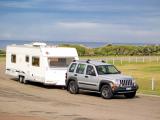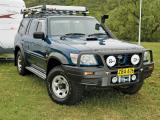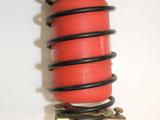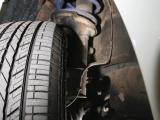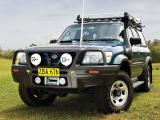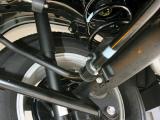Spring Time!
When purchasing a tow vehicle, it's vitally important you pay special attention to its suspension configuration. We all want our vehicles to be comfortable to ride in, but we also need them to be able to handle the weight of the van trailing behind.
There are three main types of springs used in automotive suspension: torsion bar, leaf spring, and coil spring. Torsion bars are fitted to the front of some 4WD models, and leaf springs to the rear of others. The most common is the coil spring, which is now fitted to the front and rear of most production vehicles.
As its name suggests, a coil spring is manufactured by 'coiling' a length of round spring steel into the required design. They are fairly cost effective to produce, lightweight and compact, which is perfect for a tow vehicle. Because they can be manufactured using different diameter material, the springing rate can be infinitely varied to suit the weight of the vehicle and the desired comfort level.
A coil spring can be fitted to either independent or rigid-axle configurations, providing superior ride and handling characteristics to both leaf and torsion bar systems. Their application in the rear of your tow vehicle is most important here, as coil springs are an excellent compromise. Because they don't form part of the suspension mounting (like a leaf spring), additional trailing arms are used to connect the actual coil suspension to the chassis.
Manufacturers use coils in cars to provide competent on-road handling over any surface. 4WDs and light trucks continue to use leaf springs in the rear if they are weight-carrying models (like most 4WD utes), but many large 4WD wagons are fitted with coils to improve their overall handling. Coils also exhibit excellent off-road wheel travel for the 4WDers amongst us!
Coils operate by extending and compressing as your suspension moves up and down over the terrain. Called compression and rebound, this coil spring action isn't as harsh as a leaf spring. Because they aren't as rigid as a leaf spring, coils can't quite carry the same heavy loads. When at rest, the coil sets the ride height of the vehicle, which can be varied by fitting a raised or lowered spring. When you add weight to the rear of the vehicle (by hitching your van for example), the coil spring compresses. Moderate loads don't usually cause too much hassle, especially if you use a weight-distribution hitch.
If the rear of the vehicle starts to sag badly, you lose ground clearance and suspension travel, which affects handling and stability. This is where coil springs excel – this problem is easily rectified by fitting a raised height coil or airbag helpers. Both of these options are very cheap, and can be tailored to suit your specific needs. Fitting a heavy leaf spring, on the other hand, severely reduces ride quality and can become quite expensive.
Coils are a great compromise for us travellers for all these reasons. When you've got the van parked, your vehicle will still be comfortable to drive everyday and handle well. When it comes time to hitch up, your suspension will be more than able to handle the weight, and if you need to upgrade a little, it won't cost you a fortune!
Please note that current prices may vary from this review. Please confirm with the manufacturer.
WORDS AND PHOTOGRAPHY BY LUKE BRAND ADDITIONAL PHOTOGRAPHY BY ROBB COX





